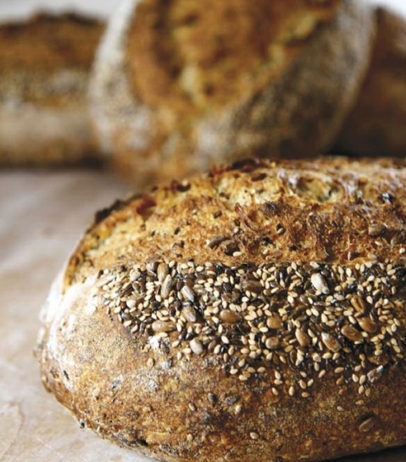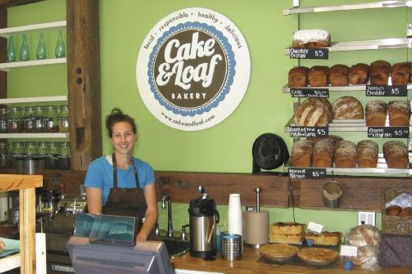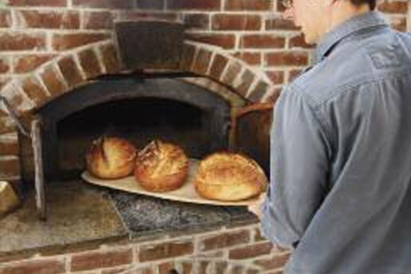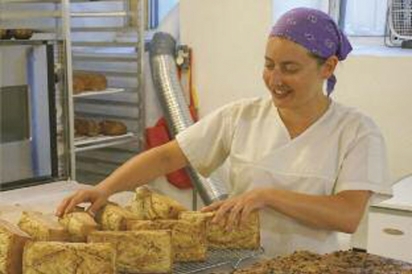Artisan Bakeries Transform Goo into Something Extraordinary
How three artisan bakeries are making their mark, brick by brick
I recently visited three bakeries in three different Ontario cities, each putting out uncommonly delicious breads. Yet when I sat down to knit their stories together for this article, I realized that I'd never before uttered "bread" and "uncommon" in the same breath. Somehow I'd always thought of bread as something quite ordinary. (Although, admittedly, I hadn't really given it much thought at all.) Perhaps it's because bread has always been at hand: as toast for breakfast, in a sandwich at lunch, slathered with garlicky butter as a side dish at supper.
It's such a key part of so many food traditions that bread and baking pepper our speech, even when we're not talking about food. We talk about half-baked ideas, about being the breadwinner, about putting bread on the table, about earning dough, and about bread-and-butter issues.
Bread being such a staple item, it is now available everywhere, from corner stores and wholesale warehouses to my local pharmacy. Because of this, small neighbourhood bakeries with in-house bakers have, in the past number of decades, become almost a thing of the past. Yet though it is so widely, and inexpensively, available, good bread—really good bread—is exciting. Over the last few years, dedicated bread makers across the province have been willing to take their passions and their skills, not to mention lots of risk, and forge businesses centered around the making of it. The four bakers I spoke to take just flour, salt and water—three commonplace ingredients—and make their own uncommonly good bread to compete with the mass-produced, commercial stuff most of us grew up with.
While each of the three bakeries is at a different stage of growth and each has a different approach to reaching consumers, they all share the challenge of getting people excited about their uncommonly good bread. I'd always envisaged bakers as clad in whites and working in well-appointed kitchens, but I've started to see that alongside the craft of baking comes the hard work that any entrepreneur faces: selling the goods and growing the business.
CAKE & LOAF
A bricks and mortar storefront
Cake & Loaf Bakery has been on my radar for a few years, since I first met co-owner Josie Rudderham selling bread, treats and coffee at an heirloom-tomato-plant sale in Niagara. On that day, she put a bag of cookies in my hand and said, "These are for your kids." They were delicious, and only half of them made it home. At the time, Josie was doing special orders and selling at local events and farmers' markets. There was no retail outlet and the baking was done in her licensed home kitchen.
When I met Josie at the same event a year later, things had changed. The bakery had metamorphosed into another house, this one with a storefront shop. Soon after, I visited the Hamilton bakery for a tour with co-owner Nicole Sherman. Josie was not there, having worked the previous few nights baking bread. "The bread baker is on vacation," she later told me by phone, adding with a laugh, "I'm not letting him go on vacation ever again!"
What is now the home of Cake & Loaf Bakery had been a barber shop with cast iron chairs. While Nicole was painting the Dundurn Street shop readying it for opening day, a man came up to her, puzzled that she wasn't setting up shop on trendy Locke Street a couple of blocks away. "Good luck to you anyway," he said.
When creating their business plan, Josie and Nicole anticipated that teachers from the school across the street would become customers at the bakery. To their delight, they get parents, too. And it's no longer just locals who are shopping there. Nicole enthused that they now have out-of-town regulars coming by the shop.
The two met while both were in the Baker-Apprenticeship Program at Niagara College. They lost touch but later reconnected on Facebook and met for a coffee. As they each spoke of opening a bakery, they realized they had the same vision. And, although they became co-owners, their initial roles were very different. "She is predominantly the loaf, and I, the cake," Nicole explained.
The original business plan called for the two owners and two employees. At the time of my visit, the new location and store had been open for less than a year and they had fourteen employees. "Our production and staff tripled within only a year of being open," Josie beamed. She has recently stepped away from baking to focus on the business side of things.
Using locally sourced ingredients, including organic flour, is a key tenet of their business and they've met many of their suppliers at farmers' markets. In the bakery's garden a couple of doorways over, Nicole showed me tomatoes that would be going into the heirloom-tomato mozzarella focaccia. With the community-focused business and tasty wares, Cake & Loaf could help transform this street into another Locke Street. The passerby who was initially skeptical about the location has become a regular customer and has taken Nicole aside to say, "Now you got it!"
POLESTAR HEARTH
A bricks and mortar oven, but no storefront
Having watched Cake & Loaf grow into a bakery with a storefront, I was interested to talk to bakers with businesses at a different stage. So it was time for a trek to Guelph, where I met Jesse Merrill, who runs Polestar Hearth.
My first communication with Jesse was via his cheeky e-mail address, crust@polestarhearth.com, so when I was about to meet him in person, I was hoping that crust would come up in our conversation. It sure did. Jesse pointed to a red canister beside the oven and explained that it's for steam, something he applies while the bread in the oven is still expanding. "It's really crucial to the development of crust," he related, explaining that without steam the crust dries too quickly, before the sugars have finished caramelizing—resulting in a grey crust. "The crust is where most of the flavour is in a loaf of bread," he added.
As the name implies this is an open-hearth bakery and, in true cottage-industry style, is centered around the brick oven in Jesse's backyard. To reach the oven we passed through the bakery (a room attached to the side of his house), which was filled with the delicious aroma of bread cooling on racks. He made the oven, his second, when his son Joseph, now three years old, was five days old. (He and his now eight-year-old daughter Lily built the first oven at his former house). "[Joseph] doesn't know that other people don't have ovens in their yards," Jesse laughed.
There is no retail store. When Merrill first started out, he hoped to sell at farmers' markets but wasn't able to get a spot. That forced him to find another way to sell bread. So for the first three years, the business sold bread exclusively through a CSB (community supported bakery) program, similar to the CSA model. Bit by bit, retailers and restaurants came calling for the bread that he bakes in the time-honoured tradition of European bread-making artisans. Jesse and his business partner, Scott Williams, still run the bread-share program. One incentive for getting customers to subscribe is that there is a wider selection of breads available through the program than at retail outlets.
While Polestar Hearth is literally in his backyard, Jesse pointed out that it is not without many of the regulatory steps that other businesses have to go through; he has worked with the City of Guelph to satisfy zoning, health, and fire safety-related requirements.
Before becoming a baker, Jesse was a craftsperson working with stringed musical instruments. He noted that his father was also a craftsperson but that he never really made a living at it—which motivates Jesse to have a craft AND make a living. Doing so, he believes, means figuring out how to weave together work that he likes, a product of which he is proud, community, and family. Jesse thinks it would be nice to eventually have a physical retail location to showcase the Polestar Hearth breads he makes almost exclusively with organic flour, but this will require a considerable jump in sales and production.
I asked Jesse to tell me what a discerning bread consumer should look for. "For me, as an artist, a nice, symmetrical loaf," he replied. He added that he likes that the bottom of each of his loaves is embossed with the brick pattern of the hearth floor. And the crust? It is very important that it be nicely coloured, he explained, with some russet, some black, and some light wheat colour peeking through. Wood-oven baking—and the all-important steam—create the glorious crust that, combined with Jesse's use of wild yeast and a minimum total rising time of twenty-four hours, results in an exceptional finished product.
NICE BUNS BAKERY
Someone else's bricks and mortar
After visiting Cake & Loaf and its storefront and Polestar Hearth with its own baking facility, I then headed to College Street in Toronto to learn about Nice Buns Bakery, a new operation which has neither its own bakery nor a retail store, but is turning out caramelized-onion fougasses and focaccias, as well as sourdough breads and a few other specialties that have begun to seduce the palates of Torontonians, many of them gluten intolerant.
As we sat outside The Depanneur on College Street munching walnut-raisin sourdough bread, owner and baker Sara Lapell reflected on the allure of bread baking. "It's like alchemy," she mused: taking things that aren't delicious on their own—flour, salt, water—and combining them into a goo—dough—which is hardly appealing. But yeast, time, the touch of a baker, and heat transform that goo into something extraordinary.
Sara does her baking for Nice Buns Bakery out of shared space at The Depanneur, which is a privately run food hub with two commercial kitchen spaces (street- and basement-levels) available for hourly rental, a venue for culinary classes and events, and a drop-in dinner spot featuring guest chefs and chef students.
Pointing out the large work surface and the professional convection oven, Sara declared, "You don't see a big mixing machine..." It's a small space with just the basic, essential equipment, on what she likes to call a human scale. It was close to noon on a Thursday when I arrived and she had been there since six. She bakes at The Dep (as The Depanneur is fondly referred to in the community) every Tuesday and Thursday morning.
"Sourdough is built in stages," Sara explained as she took me through the fermenting process of the wild-caught yeasts she uses and the slow-grown breads that result. "It's interesting. It's alive. It's also the first way people made bread," she related, and then elaborated about having worked for an Old World baker who couldn't understand why people would buy yeast, something that can be harvested for free.
"There are a lot more flavours in the sourdough than the sour flavour," Sara noted, explaining that lactic acid gives sweetness, and acetic acid, sourness. The former, she said, develops best at cooler temperatures; the latter, at warmer temperatures. "This is a relatively mild sourdough," she noted about the bread we were eating, meaning it is more on the sweet than sour side.
Sara got very excited talking about the gluten-free sourdough bread and focaccia recipes she has developed and now focuses most of her Nice Buns Bakery sales on, saying, "I've had a lot of great feedback about [it]." She explained to me why it's easier to find better gluten-free cakes than bread: "Gluten is sometimes called the 'muscle' of bread." Cakes aren't expected to be springy; bread is. She has figured out how to replace that muscle and make gluten-free bread that has elasticity.
This is a young business. The idea for the bakery was born in the summer of 2011 and it was launched in January 2012. "It didn't take me long to figure out that bread would be my focus," Sara related. She has sold at farmers' markets, which she said are great for promotion and face-time with customers, but is now working on building the wholesale side of the business, which she likes because she has her bread orders in hand before she sets out to bake.
Intrigued by the business name, Nice Buns Bakery, I asked about it. She laughed and recalled a college assignment that required a fictitious bakery name. Sara's love of baking predated college. Her grandmother, mother and sister all bake, and she has lots of admiration for home bakers who contend with less-than-ideal conditions.
On the day of my visit she'd been contacted by a retailer inquiring about selling her bread, all of which she makes using organically grown flours. "Still small, room to grow," she reflected. Ultimately, she would like to grow the bakery enough to warrant its own location, but for now she's happy with the status quo.
Each of these bakery entrepreneurs sees room for expansion. With their baking business on firm footing, Josie Rudderham and Nicole Sherman at Cake & Loaf have added something new, and now have a chef who prepares savoury lunchtime items for the walk-in crowd. Jesse Merrill at Polestar Hearth thinks it would be great to have his own retail location to showcase his breads, but this will require a considerable jump in production and staff, so for now his focus is on growing sales. Sara Lapell also hopes one day to have her own location, but for now she, too, is concentrating on growing sales. The shared space she rents out at The Depanneur means less risk—and lots of camaraderie.
Cake & Loaf Bakery
321 Dundurn St. South, Hamilton
(289) 389-6581
The Depanneur
1033 College St., Toronto
(416) 828-1990







